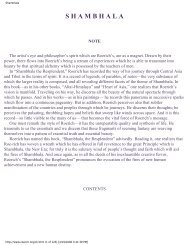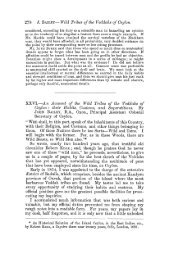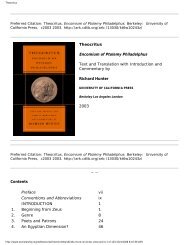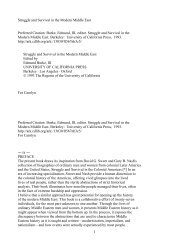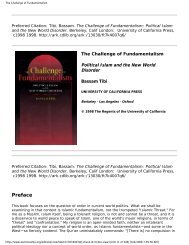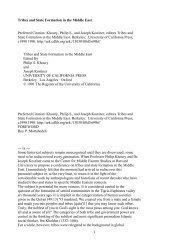Between Two Worlds Kafadar.pdf
Between Two Worlds Kafadar.pdf
Between Two Worlds Kafadar.pdf
You also want an ePaper? Increase the reach of your titles
YUMPU automatically turns print PDFs into web optimized ePapers that Google loves.
so that even people of other lands started to arrive."[32] Modern scholars who<br />
write about Turkish conquests as a kind of "liberation movement" that spread<br />
justice, equity, and tax breaks to Muslims and non-Muslims are generally and to<br />
a large extent accurately perceived as engaging in chauvinistic apologetics. But<br />
how are we to interpret this assertion by a late medieval historian? He too may<br />
be propagandizing of course but even propaganda reflects a certain concern with<br />
the principles embedded in it. The theme of the conquerors' interest in the lot<br />
of the subjugated people in fact runs through many frontier narratives. In some<br />
of the anonymous chronicles, the Ottoman administration of the fifteenth century<br />
is bluntly criticized for not taxing its non-Muslim subjects as fairly and<br />
mildly as it used to. This concern for fiscal moderation is corroborated by the<br />
Ottoman law codes to the extent that these later sources shed light on the<br />
earlier practices. The preamble to the 1530 law code of Bayburt, for instance,<br />
sets the whole code in a comparative perspective by pointing out that the people<br />
of the area were unable to bear the burden of the previous laws of (Akkoyunlu<br />
Uzun) Hasan . Thus, "some exactions have been cancelled and some reduced" under<br />
the new regime of the Ottomans, who realize that the well-being of their<br />
subjects is "the reason of the longevity of the state and of order in the<br />
realm."[33] The early Ottomans apparently faced a<br />
― 132 ―<br />
competitive situation in terms of fiscal moderation, too; at least one of their<br />
rivals, Umur Beg of Aydin, proudly announced in an inscription in Denizli that<br />
he had abolished a local tax. [34]<br />
This should not be surprising, however; nor can it be equated with modern<br />
apologetics. There were pragmatic considerations here as the wording of the law<br />
code itself makes dear: relative leniency and equity could ease the tensions<br />
between rulers and subjects, especially when such rule was quite young and<br />
possibly precarious. Moreover, decades of political instability and nomad and<br />
raider activity had devastated a good part of the countryside in Anatolia and<br />
also led to depopulation; any enterprise that looked forward to a serious<br />
political future would want to have producing, tax-paying subjects in its<br />
domains. The dislocation of the agrarian population was caused to a large extent<br />
by Turkish tribal movement, raiding, and colonization, but if any of those<br />
tribes or raiders were to settle down to rule, their priorities would naturally<br />
need to be redefined.<br />
In this context, it is worth reconsidering the dream narrative, which, from Apz<br />
through Hammer, Gibbons, his critics, and Lindner, has somehow figured in all<br />
accounts of early Ottoman history. At least since Hammer, these historians have<br />
also been aware that similar dream legends adorn the foundation narratives of<br />
many other states. To a hyper-rationalist sensibility, this implies that the<br />
story ought to be dismissed altogether or understood merely as a device for<br />
satisfying the "psychological needs of the population" in the sense of massaging<br />
their superstitious piety (and fooling them?) into submission. [35] If one is<br />
not satisfied with the underlying assumption of pure and simple gullibility,<br />
however, one might profit from Roy Mottahedeh's brilliant suggestion, on the<br />
basis of examples from medieval Islamic history, that such dream narratives can<br />
116




